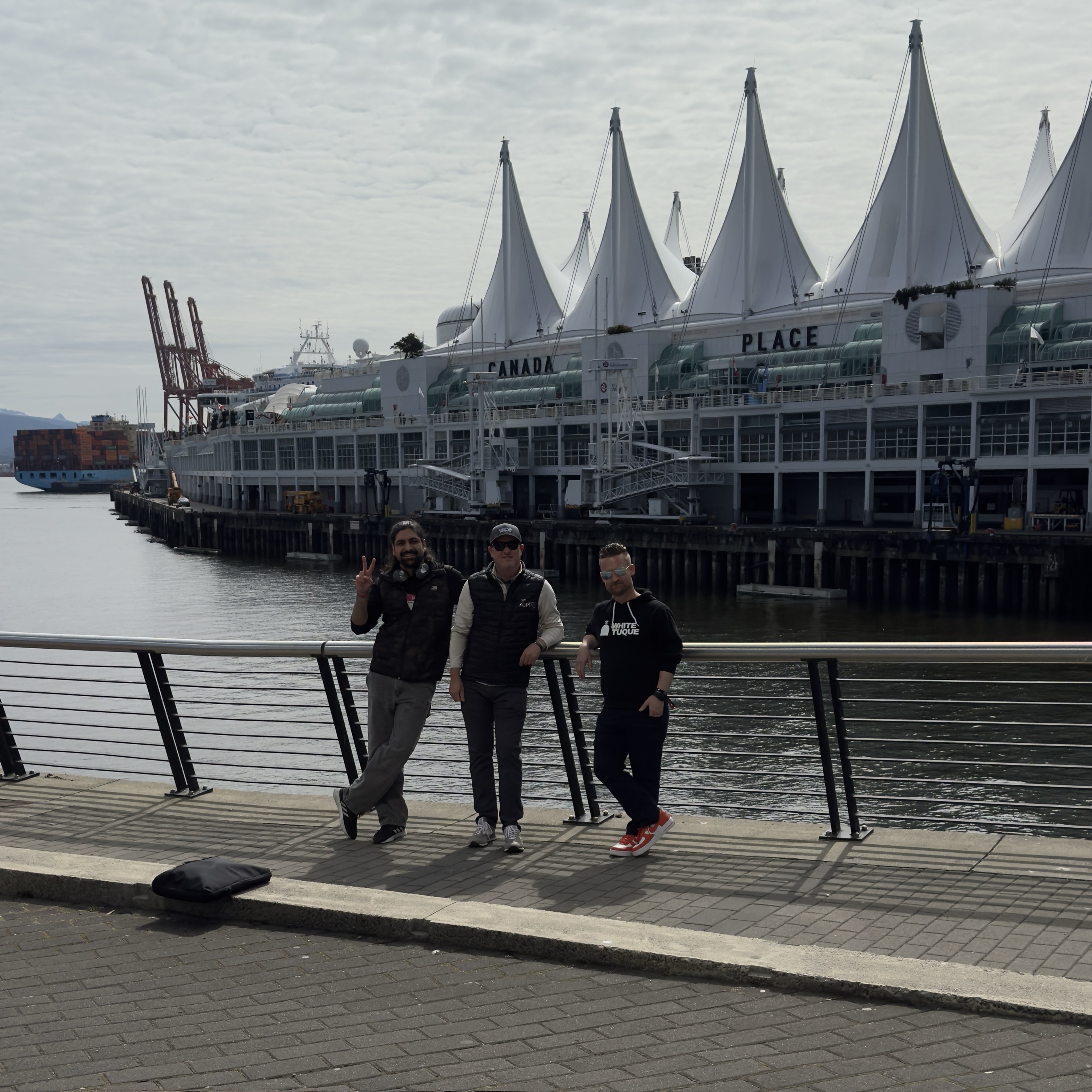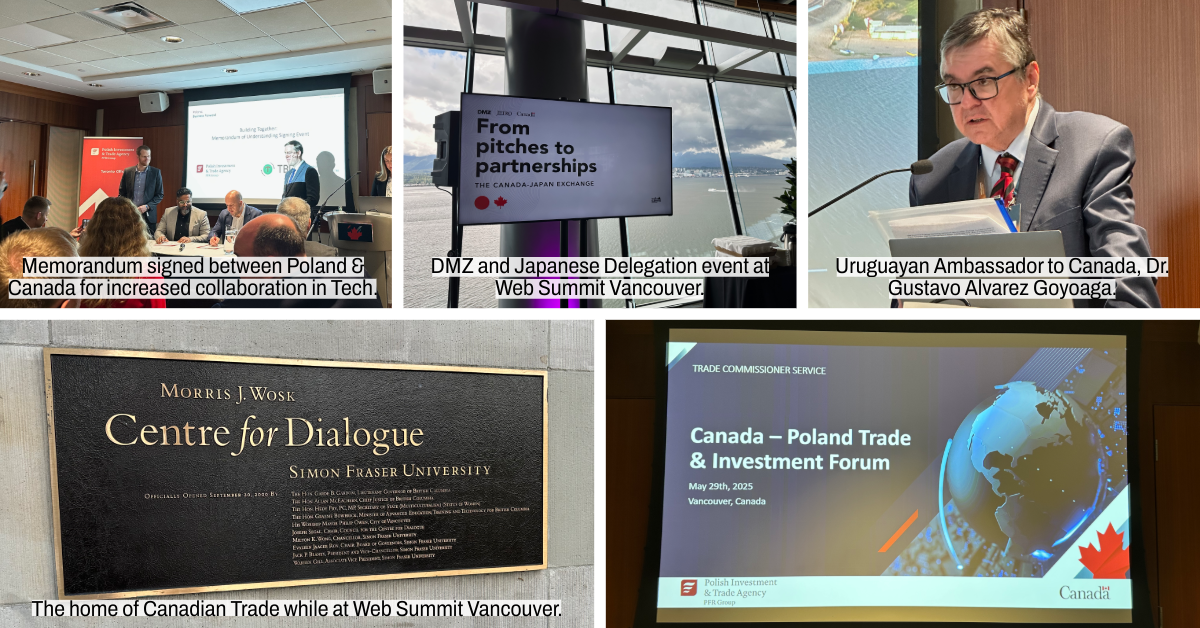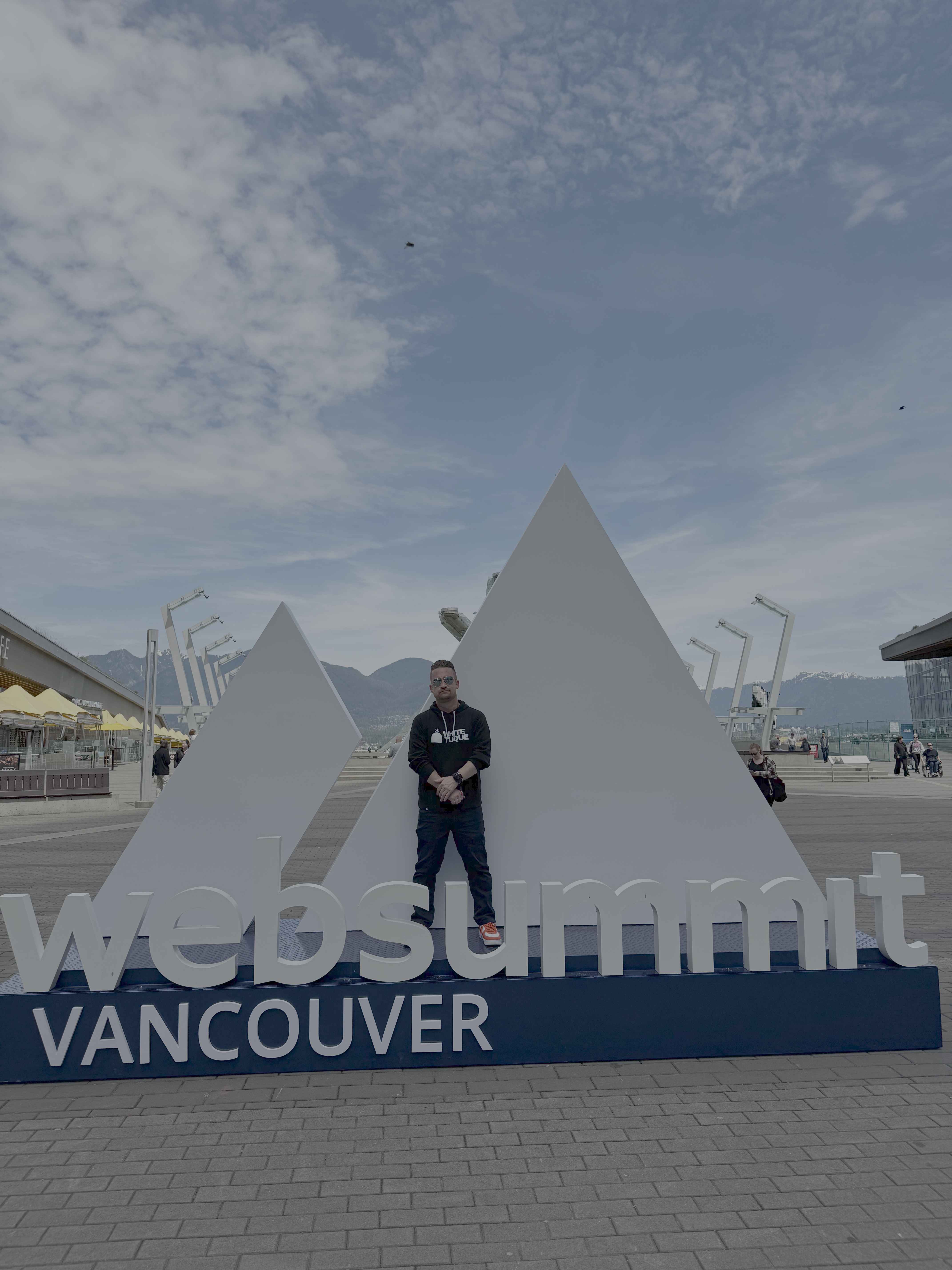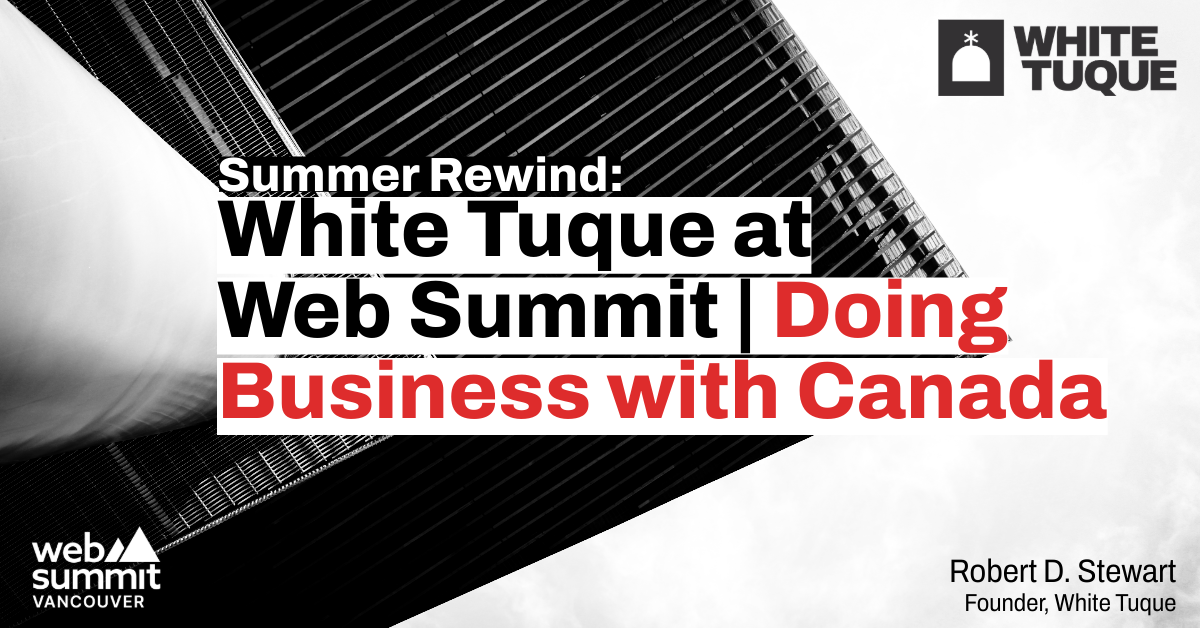By Robert D. Stewart
Web Summit Vancouver was always going to be a big week, but I didn’t expect it to be this rewarding. Between the incredible setting, the bustling conference floor, and the satellite events that gave real depth to the experience, it was one of the most memorable weeks of the year for me, and for our White Tuque team. I was lucky to be joined by Chris and Amir from the WT crew, which helped make the dual-track nature of the week a whole lot more manageable. Between our participation in the Canadian Trade Mission, time spent on the Web Summit floor, and a few key side events, we kept moving — and learning — from morning to night. We were also proud to represent the DMZ, DMZ Innisfil, and more broadly, to be champions for Simcoe County. You could feel that regional pride all week, and it was a true privilege to share what’s happening outside the usual Toronto/Montreal/Vancouver triangle.

Do Business with Canada
Thanks to Global Affairs Canada and the Trade Commissioners Service, I had the chance to take part in the Do Business with Canada initiative at Simon Fraser University. It was a perfect complement to the buzz of the main event — a quieter, more focused space where real trade conversations were happening. As someone who’s worked across both Canadian enterprise and startup life, I had a platform to represent both White Tuque’s mission and the broader story of Canadian innovation. Because in a world where resilience, compliance, and trust are becoming competitive advantages, Canada has a lot to offer.
At Do Business with Canada I spent time with global trade delegations who are all navigating the same risk-heavy environment we are. But what stood out was how many of them view Canada as a beacon of trust, talent, and tech resilience. Whether the conversations were formal or happened over coffee, they all pointed to something bigger: Canada isn’t just participating in global tech, we’re helping lead it. Here’s a recap of some of the discussions:
European Union
- EU reps echoed what we preach at White Tuque: secure, compliant startups are more likely to succeed. Preaching cybersecurity-first startup building — something we’ve been saying for years. Europe gets it. If you’re scaling to the EU, we need to talk.
- A standout moment for me: Hearing EU leaders talk about the importance of building “compliant by design” startups echoed our exact philosophy at White Tuque. More startups fail in the EU than anywhere else because they overlook risk and compliance until it’s too late. Canada has an opportunity to lead by example here — and I’m proud we’re already doing that.
Japan
- The Japanese delegation used the event as a launchpad to announce increased investments in Canada. Their trust in Canadian startups is long-standing and growing. It was a proud moment and a recognition that Canada is seen as a strategic tech partner with deep value.
Colombia
- The energy from the Colombian delegation was contagious! Bogotá is emerging as a serious player in Latin American tech, and they’re building fast. It’s clear that Canada is top of mind as they look for partners who understand the balance between growth and governance.
Uruguay
- I’ll admit, I didn’t expect to have such a rich conversation here. But learning that Uruguay and Canada often rank first and second place in quality-of-life metrics across the Americas was eye-opening. Their nationwide initiative to provide every student with a laptop and internet over a decade ago is now paying off, and their emerging tech workforce is one to watch.
Poland
- Probably the most emotionally impactful session I attended. The Polish ambassador and multiple premiers spoke candidly about Canada’s legacy of support over the last century. I was in the room for the signing of a memorandum of cooperation between our two countries’ tech ecosystems. It was a reminder of what these relationships can mean when rooted in real trust.
- I’ll remember this session for a long time. Leaders from Poland spoke with deep respect about Canada’s legacy as an ally, and their commitment to building even stronger ties going forward. Watching a tech partnership agreement be signed between our two countries was a reminder that diplomacy and innovation go hand in hand.
There were also great moments with the Northern Irish delegation at the prestigious Vancouver Club, thoughtful conversations with representatives from the High Commission of Canada supporting the Caribbean (especially around how Canada can support growing island-based startups and technology companies), and of course, my biggest miss of the week: not making it to the Dutch Consulate’s private event — apparently a must-attend with Liberation Day energy alive and well, much like the connection between the two countries. Thanks again to DMZ for inviting me to such an amazing event.

Views from the Summit
Before Web Summit even officially kicked off, we had a fantastic start thanks to our friends at Qualys and BSides Vancouver. It was great to connect with BC’s cybersecurity community and join a group that’s pushing forward with purpose and collaboration. From there, it was full throttle. The setting? Absolutely stunning. Vancouver’s Convention Centre (once the media hub for the 2010 Winter Olympics) sits right on the water, framed by mountain views. Easily one of the most beautiful venues at which I’ve ever attended a conference.
But beyond the scenery, the content and crowd were top tier. There were folks who’ve been to every Collision and Web Summit since Lisbon 2016, and others attending their very first event. That blend made for conversations that were insightful, honest, and refreshingly grounded. As someone who’s a proud member of the Canadian tech ecosystem, it was heartening to see the diversity of attendees: from Collision regulars to Web Summit veterans to first-timers soaking it all in.
Even with such a diverse collection of individuals, one theme that kept popping up in conversations was this: We’ve built an incredible tech foundation — now how do we scale it into production safely? That’s where security, compliance, and smart operations come into play. It’s a question that’s been central to our work at White Tuque, and it was encouraging to hear others bring it forward in hallway conversations and at panel discussions, too. It is becoming obvious that innovators and leaders know the importance of cybersecurity will only increase, especially as concerns around AI and cybersecurity continue to bubble up.
We also made some great local connections in Vancouver. Shoutouts to Geoff Linton and Wayne Carrigan, who didn’t just give us insights into the local ecosystem but stepped in as informal guides throughout the week. That generosity of spirit — the willingness to help, connect, and share — really stood out.

And then there were the unexpected wins. One highlight came from Amir, who after attending a local DEFCON community event, found himself presenting his red teaming research to the DC604 hacker collective at a Microsoft-hosted event. As he put it, “After a week of non-stop networking, that talk — and the feedback I received — gave me a second wind. Getting that kind of feedback from passionate, knowledgeable peers reminded me why we do this.” Seeing a teammate take that kind of leap, own the room, and share something he’s passionate about? That’s what makes all the effort worth it.
I left with a renewed sense of purpose. There’s a lot we still need to build — especially when it comes to cybersecurity and international tech cooperation — but Canada’s position in the world is clear: we’re seen as stable, strategic, and a partner worth betting on. And I’m proud to be part of telling that story. I think what made Web Summit Vancouver so memorable wasn’t just the talks or the networking. It was the mix of global energy and local authenticity. Canadian tech is having a moment, and this felt like proof. And for our team? It’s only fueled the fire for what comes next – every company cyber resilient.



